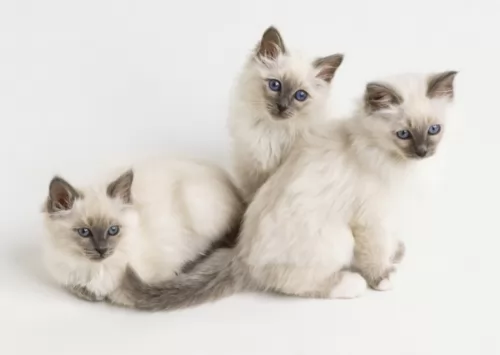 Petzlover
PetzloverBirman is originated from France but Selkirk Rex is originated from United States. Both Birman and Selkirk Rex are of same weight. Both Birman and Selkirk Rex has almost same life span. Both Birman and Selkirk Rex has same litter size. Both Birman and Selkirk Rex requires Moderate Maintenance.
 There isn’t clarity as to this exquisite cat’s origins. Many people believe they originated as the companions of temple priests in northern Burma.
There isn’t clarity as to this exquisite cat’s origins. Many people believe they originated as the companions of temple priests in northern Burma.
The cats somehow found their way to France, and it is believed that they have been in France since the 1920s.
The cats nearly disappeared during World War II, but luckily the remaining Birmans that survived were crossed with Siamese and Persians to strengthen the breed. In the early 1950s, pure Birnam litters were produced. It was in about 1959 that Birmans were brought to the United States.
The cats were also recognized in Britain in 1965 and in 1966 by the CFA. The first Birman cats were seal point but later other colors were brought in such as red, chocolate, and tabby.
The Selkirk Rex originated in the USA in 1987. A host of cats have been used to develop this cat breed – Persians, British Shorthairs, Himalayans, American Shorthairs, Exotic Shorthairs, and others.
There was a litter of kittens and the odd one out, one with an unusual coat – was placed with the breeder, Jeri Newman, who bred the cat with a black Persian.
Three Selkirk Rex kittens were born as well as three straight-haired kittens. The cat has been developed with either long- or short coats. The Selkirk Rex cat breed is recognized by various cat associations such as the International Cat Association, the American Cat Fanciers Association in the 1990s as well as the Cat Fanciers Association in 2000.
 These are medium-sized cats which can become fairly large. They can weigh up to 4, 5 or 6kg. They are fairly heavily boned with a broad face and ears that are widely spaced.
These are medium-sized cats which can become fairly large. They can weigh up to 4, 5 or 6kg. They are fairly heavily boned with a broad face and ears that are widely spaced.
The round eyes are deep blue. The cat’s fur is medium-long and should be silky to the touch with no undercoat. Ther cat is a moderate shedder.
The base color is whitish to cream, but the kittens are always born white. Coat color, whether red, cream, or chocolate is always pointed and the cat always has the white paws.
The Birman isn’t as outgoing as some of the other cat breeds and its a quiet, docile intelligent cat that attaches itself to one particular family member. They can actually become jealous of their human companion and demand their attention.
These friendly cats are wonderful choices for families with children and dogs. They are calm and affectionate, and softly spoken, quietly letting you know when it’s dinner time and enjoying just being around his human family.
He is able to get along well with kids and other pets in the home. He can become quite playful too and because he is so intelligent, you can buy him some toys that require him to think.
The Selkirk Rex is a medium- to large-sized cat that will weigh between 3 to 6kg. He is a well-built cat of which you get a short- and long coat variety. The coat is available in all colors. The coat has a soft, woolly look to it with some curls.
With the long-haired variety, the cat has a well-plumed tail. One drawback perhaps is that the cat is a fairly heavy shedder, and perhaps wouldn’t be a good choice for those with allergies.
This is a lively, playful, energetic cat with a friendly temperament. Cat experts will tell you that it is the Persian and British Shorthair ancestors that have given him his placid, lovable nature. He is, however, more active than those cat breeds and loves to play.
Tolerant and affectionate, the Selkirk isn't a lap cat. Because he has a sociable nature, he dislikes being left alone for long periods of time.
The Selkirk Rex fits in well with households where there are well-behaved children and other pets. He is such a loving cat and loves to be in the company of his human companions. He isn’t demanding and likes to talk to you in a quiet voice.
 The Birman cat has to be one of the most beautiful cats there are, but the cat isn’t only a beautiful cat, it has wonderful characteristics as well.
The Birman cat has to be one of the most beautiful cats there are, but the cat isn’t only a beautiful cat, it has wonderful characteristics as well.
It is a loving, affectionate cat with his human family, loving to spend time around them. Playful and healthy, when you bring this most wonderful cat into your home, it will be as though an angel has come to stay.
When you welcome a Selkirk Rex cat into your home, you’ll have a loving friend and companion.
They love to bask in the attention they get as they’re quite unusual with their wavy to curly coats. People are always wanting to touch it.
The Selkirk Rex cat is an active, playful cat and has a whole lot of love to offer you.
 With good health your Birman can reach up to 13 years of age. With the Birman, the most serious illness is feline hypertrophic cardiomyopathy which also happens to be the most common heart disease in cats.
With good health your Birman can reach up to 13 years of age. With the Birman, the most serious illness is feline hypertrophic cardiomyopathy which also happens to be the most common heart disease in cats.
It’s a progressive disease and can result in heart failure. The cats are also at risk of developing feline infectious peritonitis.
Also, because this is a larger cat and a stocky kind of breed, it can easily put on weight and then become overweight. Strict attention will need to be given to diet as well as daily exercise.
Also, look out for Corneal dermoid - skin and hair on the surface of the cornea in one eye or in both. Luckily this is an eye problem that can be surgically corrected.
The Selkirk Rex cat, if looked after well and given excellent food can live to be 15, 16, or 17 years of age. Some of these cats can suffer from hair loss. Remember, that every cat will require vaccinations and de-worming.
Chronic kidney failure usually develops over a number of months. Chronic kidney failure in cats is a progressive illness but if you get your cat to the vet it can be managed. The vet will want a sample of your cat's urine and possibly a blood test.
 The Birman has a silky coat that sheds moderately so you want to give him a gentle brush once or twice a week to keep the coat of his soft and silky.
The Birman has a silky coat that sheds moderately so you want to give him a gentle brush once or twice a week to keep the coat of his soft and silky.
The Birman has a full topcoat, with no undercoat which means that you won’t have the coat matting or tangling.
He’ll need his nails trimmed and his teeth checked regularly. Your vet or professional groomers can do this for you and clean his teeth and check that there are no bad teeth making your pet sick.
The Birman cat has access to some great commercial cat food as there are some seriously good quality ones.
Many cat lovers choose cat foods that are AAFCO (Association of American Feed Control Officials) approved. It at least provides minimum standards for pet foods.
For your Birman you want to avoid artificial flavors and preservatives. Choose quality foods high in meat protein. As a carnivore, a cat has a huge need for meat protein. Get to know your pet food labels and choose foods with added taurine and vitamin A.
Your Selkirk Rex will need to have his fur brushed. You don’t want to brush him too hard every week as this can cause the curls to frizz. Rather use a spray bottle with some cat conditioner and lightly spray the curls and use your fingers to ‘comb’ his hair.
Provide your cat with well-balanced meals. Your Selkirk Rex is a carnivore and you have to ensure that his food is made up of meat. The best commercially manufactured cat foods know how to correctly balance your cat’s food so that it gets the perfect blend of vitamins and minerals. Always choose a good brand of cat food that will meet your cat's nutritional needs. If you’re unsure, you can always ask your vet for suggestions about good quality food that will help towards ensuring good health for your cat.
The cheaper, unknown brands may not have the best ingredients to keep your cat happy and healthy. Remember to read the labels as a growing kitten will require different food to a senior cat.
Provide your Selkirk Rex with a litter box, scratching post, and a climbing tree.
Your kitten will need to be vaccinated to protect him from some of the life-threatening diseases cats can get. Most of the vets these days recommend a combined vaccine, starting at about 8 weeks of age. These vaccines will protect your kitten from Feline Leukaemia Virus, Feline Parovirus, and cat flu.